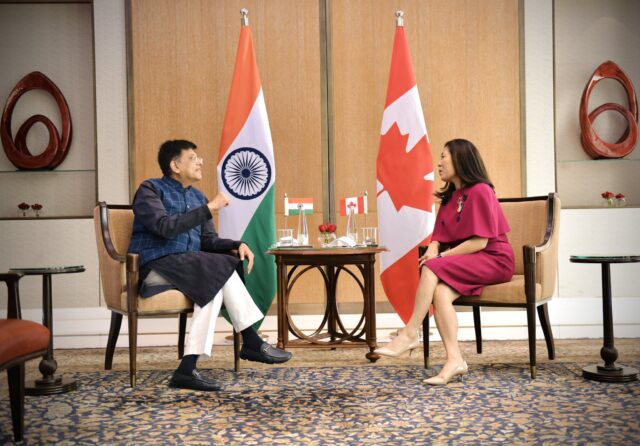Indian and Canadian officials met in New Delhi last week and decided to expedite talks on the free trade agreement between the two countries. The sides met on 11 March to participate in the fifth Ministerial Dialogue on Trade & Investment.
The formal agreement to expedite the dialogue process is expected to boost trade in goods and services.
Indian Commerce Minister Piyush Goyal and his Canadian counterpart and Minister for International Trade Mary Ng, last week decided to relaunch negotiations for India-Canada Comprehensive Economic Partnership Agreement (CEPA). The sides will also work towards an interim agreement or Early Progress Trade Agreement (EPTA). The interim agreement will streamline trade and commerce. The talks on CEPA were on pause mode for many years.
A statement issued by the Union Ministry of Trade and Commerce said: “The Interim Agreement would include high-level commitments in goods, services, rules of origin, sanitary and phytosanitary measures, technical barriers to trade, and dispute settlement, and may also cover any other areas mutually agreed upon.”
The sides were non-committal on a deadline for conclusive talks. However, there is a general understanding that finer details of talks might be ready by end of 2022. Earlier, last month India and UAE signed CEPA following negotiations spanning only over 88 days, a record time for any country.
The EPTA would have high-level commitments in goods, services, rules of origin, sanitary and phytosanitary measures, technical barriers to trade, and dispute settlement. It might cover other areas if both sides agree to it.
India and Canada also agreed to recognize Canada’s systems approach to pest risk management in pulses and market access for Indian agriculture products such as sweet corn, baby corn, and banana.
Officials from Canada have also agreed to examine the request of the Agricultural and Processed Food Products Export Development Authority (APEDA), which will allow the export of Indian organic products.
India is negotiating for FTA with many countries, however, the one with Canada will also include supply chains. The ministers who met last week acknowledged the importance of a robust supply chain. The sides will also continue to explore newer areas of collaboration such as urban infrastructure, tourism mining and renewable energy.









